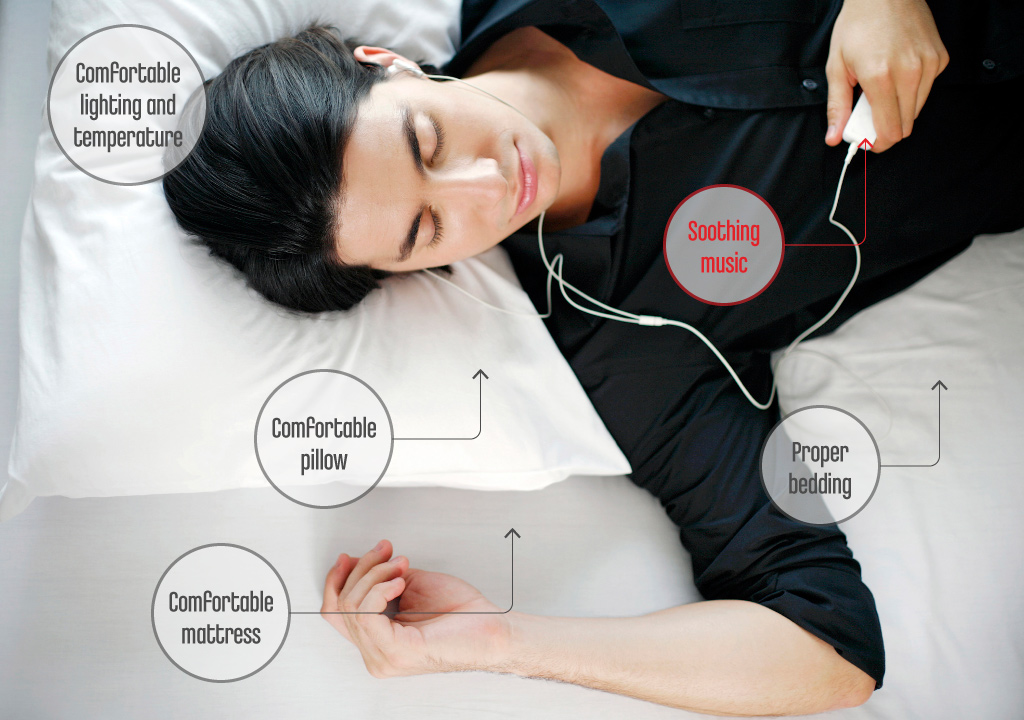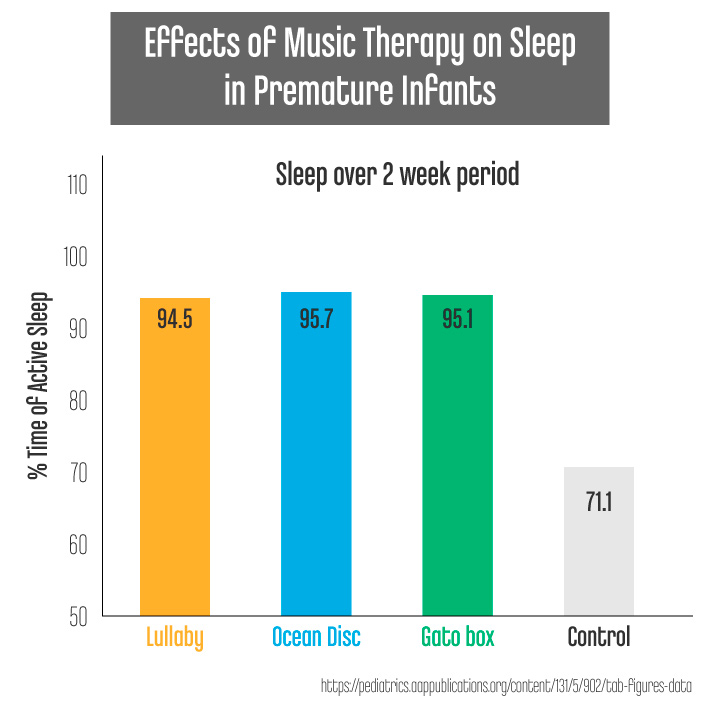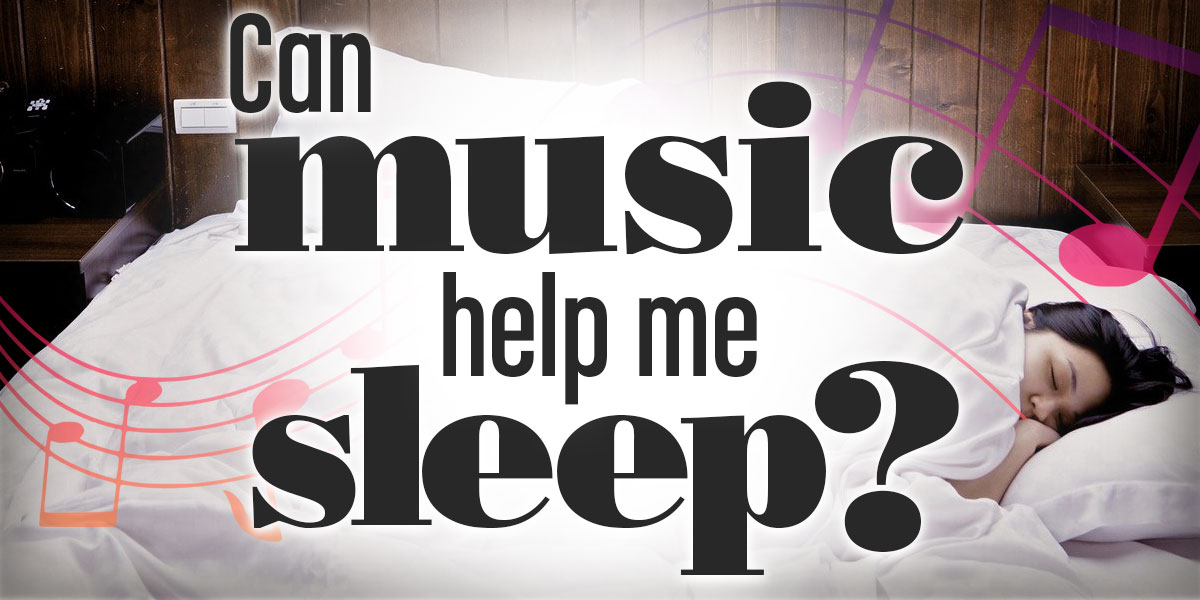Everyone knows that there are entire aisles and shelves of supplements and aids that will help them sleep in every drug store in the country, but medicinal solutions aren’t everyone’s cup of tea: fear of developing a dependency, weakened effectiveness overtime, and the monetary cost of such supplements are just a few of the reasons why some of us look for other options. And while there are a plethora of natural solutions that have been proven to be effective, one of the easiest is also one of the most misunderstood. That option is music—but not all types of music will give you a hand come bedtime.
Do certain types of music reduce stress and anxiety, helping you fall asleep better than others? Absolutely, according to science. While other factors determine just how well a piece of music can lull you to sleep, the most important factor is tempo. Specifically, low tempo music, which can be anywhere from sixty to eighty beats per minute (BPM) is your best bet.
Using music as a sleep aid is well documented and studied practice. Unlike other areas of sleep, it’s one we seem to understand quite well. Read on to learn more about how music and sleep can make a great pairing in your life.
How Does Music Help You Sleep?

Part of developing good sleep hygiene is creating and maintaining a comfortable sleep environment for yourself. This entails many things, like using the right mattress, pillow, and bedding for your needs, getting the lighting and temperature just where you like it, and keeping the physical space of the room open or closed in such a way that you feel safe and relaxed inside of it. The key is keeping those things constant, and the same principle can be applied to sound (or music) to help you sleep.
Think of white noise machines: the sound that they produce throughout the night becomes part of the background, or for some people its drone is comforting, allowing them to relax more than if the room were just silent. Music works much in the same way. Softer music with repeating rhythms creates a familiar backdrop that can be easy to lose yourself in, increasing feelings of joy and relaxation while lowering anxiety.
 It’s an idea that most of us were raised with, even if we don’t remember it. The lullabies our parents would use to send us drifting off to sleep have all the key components to get us into a primed state of relaxation: they’re soft, low, and slow. It’s not difficult to find those same qualities in other forms of music more appropriate for adults, but at some point as we grow up we forget about this simple trick or decide it’s only good for infants.
It’s an idea that most of us were raised with, even if we don’t remember it. The lullabies our parents would use to send us drifting off to sleep have all the key components to get us into a primed state of relaxation: they’re soft, low, and slow. It’s not difficult to find those same qualities in other forms of music more appropriate for adults, but at some point as we grow up we forget about this simple trick or decide it’s only good for infants.
But what works for babies and children can work well for us, too. It’s easier now than ever thanks to the digital age: with an internet-connected device always at our fingertips, we always have access to sites like Spotify, Pandora, and YouTube, and with them a massive library of music on-demand.
How Should I Listen?
When you’re ready to try using music as a sleep aid, there are two ways to go about it. The first is to listen to music for an hour before bed to get your mind and body relaxed. The second is to play the music once you are in bed and to leave it playing while you’re asleep.
Which one you choose depends largely on your sound sensitivity. This refers to how you respond to outside noises while you’re sleeping. Many of us sleep deeply enough that noise from a radio or television won’t wake us up if we fell asleep with it on, but others require as much silence as possible once they’ve nodded off. If you have high sound sensitivity, sleeping with music constantly playing in the background could result in you waking up throughout the night.
What Sort Of Music Works Best?
As mentioned earlier, not every piece of music you’ll encounter is suited for sleep. When people ask what type (or types) of music are best for sleeping, they’re usually referring to what genre of music or what types of instruments. Not surprisingly, there aren’t clear cut answers to these questions. Knowing what music works best as a sleep aid requires a little more technical information than that. The key is in the number of beats per minute a song has.
As your body prepares to enter a sleep state, your heart rate slows down, beating roughly sixty times per minute. Coincidentally, music with the same or similar BPM can trigger this change in your body faster, explaining why some songs may make you feel relaxed or drowsy. You can try to measure the BPM in any given song by counting every beat in a minute, but if you don’t feel comfortable doing so you can just use slow music.
With a little online searching, you can find the BPM to a lot of popular music, and there’s even some software that can analyze a song and give you a figure. While knowing the exact number or even an estimate can be useful, the feel of the song is what’s important. If it makes you feel excited or energized, it’s not a good pick.
If you’re a fan of online music services like Spotify, you can browse user-created playlists and find what other people are using as sleep music (such playlists usually identify themselves as such).
All of that being said, many studies point to classical music lending itself better to sleep than other genres. There’s likely a multitude of reasons for this, including the layering of instruments, the uniformity of sound, the length of pieces, and the absence of vocalized words, but this doesn’t immediately exclude other genres of music. Follow the BPM guideline and experiment with your favorite styles and artists to find a good fit for you.

What Should I Avoid In Music For Sleep?
While the qualities you should look for in bedtime music are few. The list of things that should potentially be avoided is longer. These things can be present, even in slow music with low BPM rates, so in some cases, you may have to use your best judgment. Some are obvious and can be avoided with little effort, but others are more subtle.
First, you should keep the volume low. This piece of advice manages to fall into both the obvious and subtle camps. You want to avoid loud music for sleep because the higher volume can raise your heartbeat by creating feelings of stress, increasing your heart rate.
You can certainly hear if/when an individual piece of music is too loud for comfort, but it becomes a little more complicated when listening to a collection of music on an album or playlist. Tracks pulled from the same album aren’t always mixed at the same audio level, making some louder than others. This is especially true with playlists that pull songs from different albums. This isn’t a problem if you’re listening to the radio, as stations tend to equalize their music, but if you’re streaming music from an online source the uneven levels could be disruptive.
If you wish to use music files you own, you can take an extra step by burning them to a CD. Most popular music management and burning software have advanced controls that allow you to adjust volume levels to tracks you burn to a CD.
Some other ways
Try using purely instrumental music rather than music with lyrics. Songs that feature singing aren’t inherently bad as sleep tools, but the addition of lyrics to music could create some complications when your goal is to drift off to sleep. Some studies have shown that those who use music with lyrics still fall asleep easier than those who don’t use music, but not as easily as those who relied on instrumental pieces.
One of the reasons for this may go back to the idea of creating a good sleep atmosphere. Everything needs to be comfortable without being distracting. However, words have direct meaning tied to them, creating ideas when heard and drawing your attention. While you may associate certain feelings or ideas with instrumental pieces; it’s not as direct and less likely to pull you out of sleep.
Things that you hear in your sleep can affect your dreams, which is another reason to avoid music with lyrics. This isn’t true for everyone, of course (really deep sleepers seem to avoid this problem); but those who do often are woken up by it.
Avoid music you have strong emotional connections to or that express such emotion. This ties back to the previous point: emotions can be distracting and make sleep difficult. Those who live with depression and anxiety know this all too well; music can trigger those feelings based on the associations we make with certain pieces.
However, it’s not just those with negative associations that should be avoided. Even if a piece of music makes you feel like a million bucks; the positive feelings it stirs in you could prevent you from easily falling asleep.
If you’re going to fall asleep to music, try using longer tracks. You want to make the elements of your sleep environment as constant and consistent as possible. You can set up any playlist to loop endlessly, so in a sense, it will be continuous, but by using longer pieces you’ll experience fewer pauses between songs, which means less disruption.
Does The Arrangement Matter?
How you decide to listen to music is only important if you plan to enjoy it before sleep and not during. Things like proximity to the music and the sound system won’t have any impact on how effective it is. Simply listen to your choice of music for an hour before going to bed and enjoy (don’t do this passively, however, while carrying out other tasks).
If you choose to listen to music while you’re sleeping; your best bet is to have whatever player you’re using next to your bed. If using a smartphone or anything with a screen, you should eliminate as much of the light as possible. Using headphones isn’t a viable option here: they could pull and come off if you move during your sleep. And if earbuds can become uncomfortable (and harmful) if you sleep with them in.
You could also try pillow speakers, which are pillows with speakers built-in. However, these are difficult to recommend because individual pillows can be drastically different from each other. Moreover, depending on how the speakers are integrated into the pillow, they can cause physical discomfort. Playing music through a separate device can be just as effective without having to deal with the same complications.
Anything Else I Should Know?
Music doesn’t flip some switch in your body that tells it to go to sleep. Instead, it can send signals to relax your mind and body, which then lead to better sleep. Because of this, you need to be focused on music, especially if you’re listening while dealing with stress. That’s why, as mentioned earlier, you can’t simply play some tunes while working on something else and expect results.
The methods we’ve described in this article can be used on an as-needed basis or regularly as a habit. Its effectiveness won’t weaken over time like medicinal sleep aids, and your body won’t develop a tolerance. Whether you choose to use it once in a while or every night is up to you.
For music to work its magic, you have to be able to clear your mind and swat away distractions. Intrusive thoughts snap your attention away and can lead you to ruminate. The ability to be aware of the present moment and focus your attention is called mindfulness. It’s not something most of us are taught, but everyone can learn it.
The most basic mindfulness exercise is controlled breathing. You can do this while listening to music or while in bed. The result is a slower heart rate—just like what music can do.
It works like this: take a long, slow breath for four seconds. Then, hold it for four seconds before breathing out for eight seconds. Do this for as long as you like (but at least for three minutes). Combining this practice with music can help you sleep easier at night.





